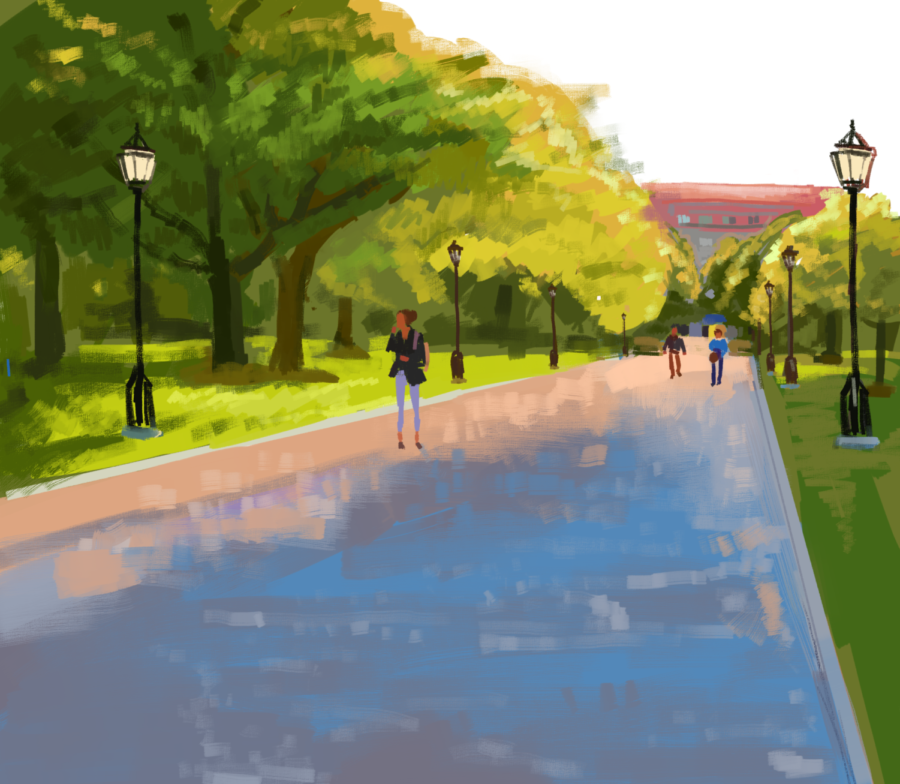UChicago’s Program on the Global Environment (PGE) may soon combine with the University’s Committee on Geographical Sciences to form a new University committee if a proposal for the merger is approved. The PGE currently houses the undergraduate environmental and urban studies major and minor as well as events, special curricular programs, and research endeavors related to sustainability.
The proposal, developed by a faculty working group of environmental and urban scholars in the humanities and social sciences, would create the Committee on Environment, Geography, and Urbanization (CEGU), to be housed within the University’s Social Science Division (SSD). The proposal will be submitted to SSD dean Amanda Woodward, who will evaluate it and consult with other administrators to determine next steps. If the proposal is approved, the College’s major program in geography would be integrated into the existing environmental and urban studies major currently offered by PGE. The geographic information science (GIS) minor, which is currently offered by the Committee on Geographical Sciences, would remain available to undergraduates and separate from CEGU.
The proposal’s creators envision CEGU as a site of interdisciplinary collaboration between undergraduates, graduate researchers, faculty, and other members of the UChicago community who are interested in conversations about sustainability, the built environment, and inquiry in the face of unprecedented anthropogenic change. Though the project is still in early phases (its website includes only an “About” section, a list of affiliated faculty, and posters for recent and forthcoming events sponsored or cosponsored by CEGU), it is gaining momentum among students and faculty who are hungry for more opportunities to collaborate on research with a real-world impact.
CEGU executive committee members Neil Brenner and Sabina Shaikh say that the CEGU proposal emerged from dual needs within the University community: the demand for more cohesive environmental study at UChicago and the need for institutions like UChicago to contribute meaningful research to society-wide environmental concerns. Shaikh, who is the director of PGE and a senior associate instructional professor in environmental and urban studies, said, “What we’re trying to create here serves a need for the world and the planet but also a need for our community to interact in this collaborative space.” She added that the committee format could involve more faculty and graduate students than PGE currently does, enabling more fruitful collaborations across ages and disciplines.
Brenner, who holds the Lucy Flower professorship in urban sociology and serves as the interim chair of the Committee on Geographical Sciences, said, “So many of the students I work with in the Core are urgently concerned about environmental conditions, crises, and futures. There’s a massive demand from our students to engage in these matters, and we on the faculty need to update and renovate our approaches and our pedagogical platforms.”
Brenner also said that CEGU comes at a moment of both crisis and innovation for the field. “We are living in a time of extreme environmental emergency, and that’s transforming our world in all kinds of dangerous, devastating, challenging ways,” he said. “We need to update and reinvigorate our frameworks of scholarship and teaching to confront the crisis that we’re living through. CEGU is an attempt—a modest attempt—to contribute to this project.”
Undergraduate programs like environmental and urban studies; global studies; and Law, Letters, and Society have the primary purpose of coordinating undergraduate majors or minors. If PGE is folded into the committee format of CEGU, it could expand to offer graduate programs as well as larger events and workshops. Brenner and Shaikh noted that the faculty working group has had preliminary discussions about a doctoral certificate and possible joint A.B./A.M. degrees within CEGU.
Brenner stressed that the flexibility of a committee format allows for outreach and interdisciplinary work and would bring UChicago’s various academic efforts in environmental studies under a single umbrella. “At present, efforts at UChicago are relatively fragmented,” he said. “There’s a lot going on across campus, and what we want to do is simply create a new platform in which to grapple with the social, historical, and geographical dimensions of climate change and biodiversity loss and other emergent environmental emergencies.”
The effort to produce the CEGU proposal has been an interdisciplinary effort of its own. Shaikh is trained as an environmental economist and now identifies as an interdisciplinary social scientist, while Brenner holds degrees in philosophy, political science, and geography. The two say that bringing together academics with diverse backgrounds is essential to meaningful environmental research. “We have to search broadly to address environmental questions,” Shaikh said. “There isn’t one disciplinary way to address them.”
The CEGU working group plan to host two student sessions in early April to present ideas for the Committee and receive feedback from undergraduate and graduate students. Additionally, CEGU will continue to sponsor speaking events on topics related to urbanization and the environment.









